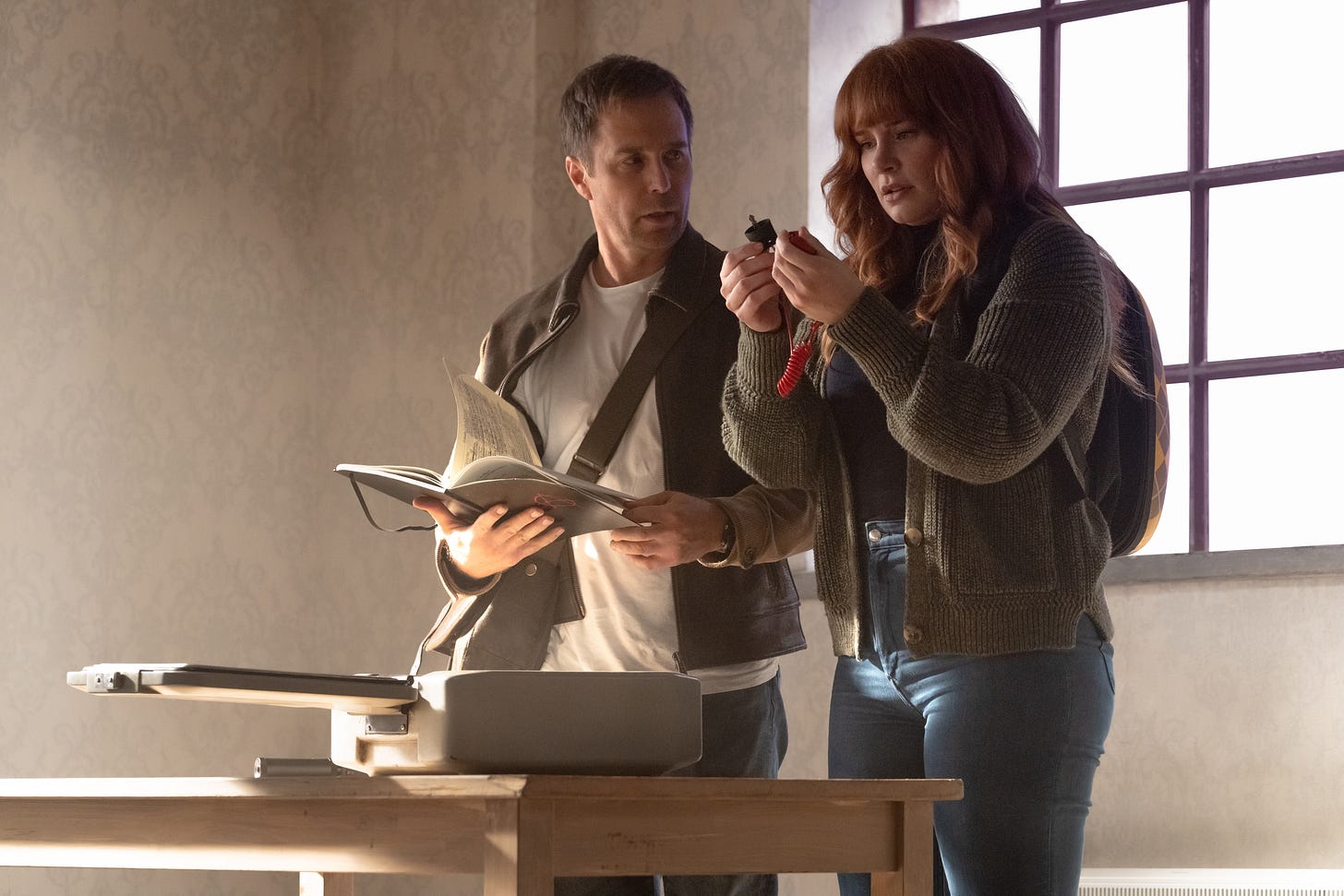Argylle
A spy movie that is more Maxwell Smart than James Bond.

Spy movies are fundamentally about identity. The protagonist must hide some part of their being while working to uncover some hidden truth hidden under layers of scheming and treachery. Argylle claims to be a spy movie, preoccupied as it is with twists, secret identities, and the repeated line “the greater the spy, the bigger the lie.” The line rolls off the tongue just fine, but the movie fails to back the platitude up. There’s no truth under it, just an empty shell.
Elly Conway (Bryce Dallas Howard), a writer of spy novels, finds herself in an international conspiracy, accompanied by rogue spy Aidan (Sam Rockwell), whom she is forced to rely on but isn’t certain she can trust. Elly’s books are bestsellers: a series of potboiler novels about a handsome spy named Agent Argylle (Henry Cavill). The “greater the spy” line is lifted by another character directly from the back flap of her latest book. Elly’s books kick off the plot as an unexpected source of hidden truth—they appear to predict events that most governments would prefer to keep quiet, and the intelligence community suspects that her next book just might be the key to some vital information. Ellie and Aidan are hunted across the globe by a small army of spies as they try to piece together the clues to the conspiracy through Elly’s unfinished manuscript for her next book.
This is all beach-read, airport-paperback plot territory, and the film cultivates the feel of a page-turning novel by planting all exposition in its characters’ mouths as they run from one green-screen substitute for a famous real-world location after another. The action is just as flat as the cinematography. There’s no depth of field, and the characters on screen might as well be talking heads in a box; the CGI mattes behind them look like generic screen savers rather than actual locations. One establishing shot declares a row of identical suburban homes to be “Chicago,” a moment that collapses one of the country’s biggest and most architecturally diverse cities into the boring sameness of an eternal subdivision.
Boring sameness, claims Aidan, is the best way for a spy to hide in the real world. Tall, stylish super-spies like the fictional Agent Argylle would attract too much attention, which is why Aidan presents himself as unassuming, a generic man in a plain t-shirt and jeans. Rockwell can be a captivating presence on screen when he’s given the opportunity, even when he’s playing an everyman. His performance in Moon in particular demonstrates how he is able to take an average person and transform him into someone we care about.
Argylle doesn’t give Rockwell the chance to distinguish his character himself. Instead, the film tries to make Aidan compelling by literally replacing the actor playing him: when Aidan and Elly first meet, Aidan has to fight off a crowd of spies, and whenever Elly blinks, the rogue spy is replaced by a vision of Henry Cavill’s suave Agent Argylle. Although the sequence is cut in an action-comedy rhythm, Rockwell’s Aidan comes across as inept in the exchange. Cavill has about a foot of height on Rockwell, and I kept wondering about how the physics of the fight would differ if it were staged true to each actor’s build. Because the two actors perform the same fight the exact same way, despite their different physiques, I began to question the coherence of the reality the movie was presenting to me.
The film isn’t interested in any consistent presentation of reality. Truth-telling is signaled primarily by characters speaking directly into the camera, but the script is shallow enough that character loyalties and motivations shift from moment to moment and scene to scene without any depth to inform them. Each successive twist, no matter how small, is treated as a grand revelation. Despite being a writer of twisty novels herself, Elly is blindsided by each successive turn: a frustrating trait because the turns are obvious to anyone who’s ever read a page-turner like the ones she writes. Howard plays Elly without any guile. Her wide-eyed reactions to the world of espionage are obvious acknowledgments that she’s a fish out of water in an outlandish situation, but because there’s no depth to the story and no modulation in its tone, her character comes across as naive.
The screenplay—and its director, Matthew Vaughn—just doesn’t know how to frame its fish-out-of-water protagonist, nor the shark she’s found herself teamed up with. As a secret agent, Rockwell isn’t scary, let alone intriguing, even when the script demands that he commit surprising acts of violence. He’s just a shallow vessel for a shallow plot.
As for the story itself, the plot feels like the frantic results of a first-draft brainstorm. Every development is surface-level—a shock to Elly and a bore to everyone else, a story of spycraft that assumes all espionage requires shiny toy guns, a massive explosion, and hurt feelings whenever anyone lies to anyone else, with no room for subtlety or even tonal variety. Catherine O’Hara and Samuel L. Jackson are wasted in bit parts that hardly qualify as vehicles for exposition.
Argylle isn’t John le Carré. No one’s playing figurative chess here. I would forgive the movie its stupidity if it had been managed to be fun, or at the very least original. Instead, it’s a facsimile of other spy romps that came before it, incapable of sustaining a coherent idea for itself. The line “the greater the spy, the bigger the lie,” which the film treats as its biggest idea, is repeated by character after character in an echo that loses its irony after the first repetition. The script simply doesn’t know when to stop. It only turns up the volume, taking on new and dumber layers with each repetition.—Sarah Welch-Larson
★☆☆☆


